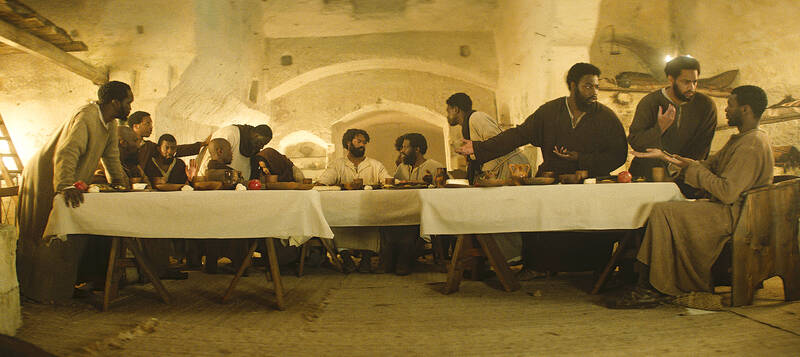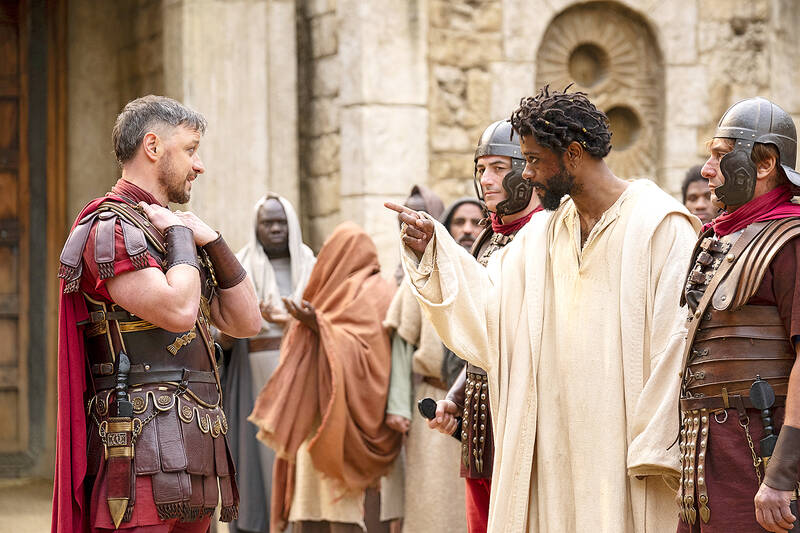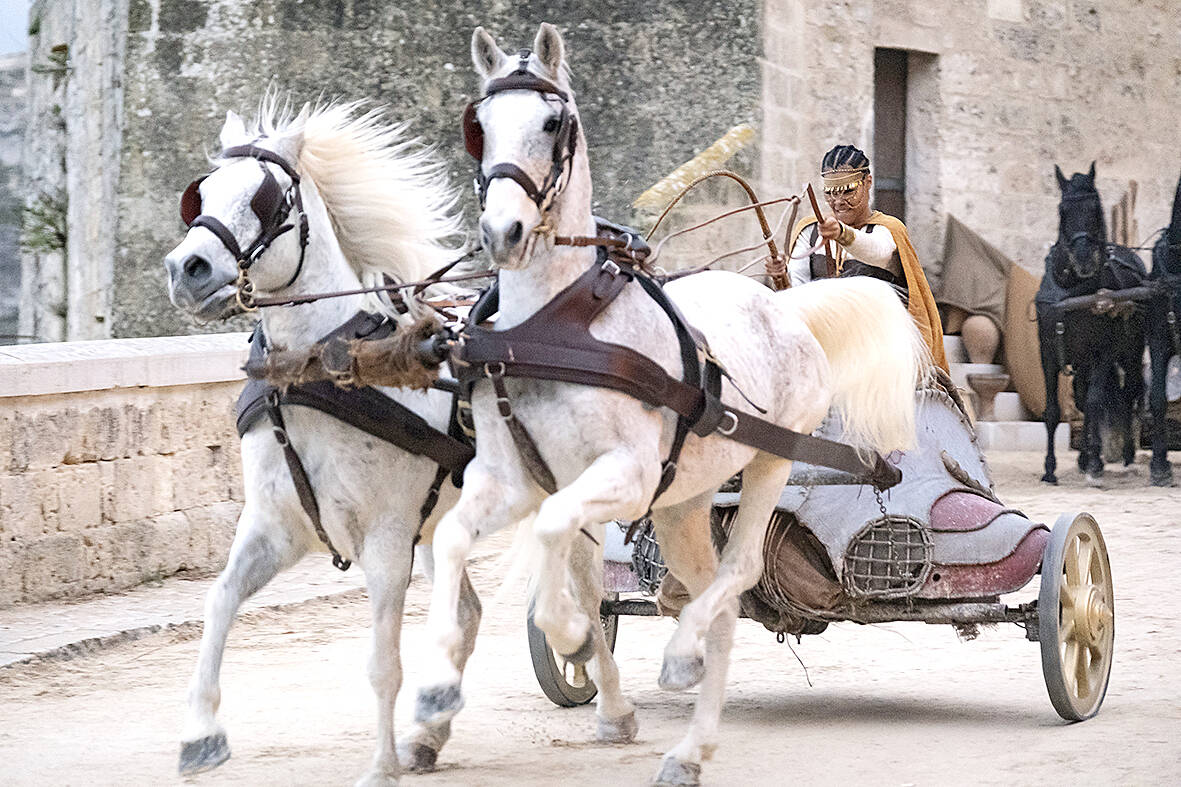Somewhere between the sacred and profane, comedy, drama and satire comes The Book of Clarence, a retelling of The Greatest Story Ever Told that arrives in theaters appropriately between Christmas and Easter.
It’s a remarkably idiosyncratic approach by rising auteur Jeymes Samuel, who for this Biblical-era tale is director, producer, writer and composer for only his second feature. You have to kind of hand it to him: Who else would have the audacity to tackle Jesus in your second outing?
The Book of Clarence — with a stunning cast that includes LaKeith Stanfield, James McAvoy, Anna Diop, Benedict Cumberbatch, Alfre Woodard and David Oyelowo — careens through tones and sentiment, silly in one and then horrific in another. Samuel says he wants viewers to have a “wicked good time” but really it’s a bit of a muddled, unholy mess.

Photo: AP
It is 33 AD in Jerusalem and Stanfield plays Clarence, a street hustler in robes who likes getting high — in one cool, surreal scene he floats into the air like a balloon — and dreams up schemes to get rich quick. He’s got the hots for a local beauty but owes a ton of coins to that beauty’s loansharking brother.
Clarence is called the “village’s mischief maker” and even his mother thinks he needs to get his act together.
“I’m not a nobody,” he tells his twin brother, Thomas (also Stanfield, naturally). “A man who lacks honor is a nobody,” his brother replies.

Photo: AP
We know things are going to end painfully for Clarence because one of the first images in the movie is of him on a cross.
Clarence doesn’t believe in God and certainly doesn’t believe that the local guy named Jesus is capable of miracles. It’s a scam to him. He tries to become a 13th apostle to pay off his debts. When that fails he decides to pretend to be a messiah, too, and get paid for so-called tricks.
Samuel, whose previous movie was the all-Black Western The Harder They Fall, has some creative ideas, like using a chariot race to honor both Ben Hur and Fast & Furious, as well as wonderfully capturing the Last Supper like a painting come alive. He apes biblical epics in his title fonts and the opening and closing of the camera’s iris. He mixes stilted language — “I must make haste” — with modern turns (“I’ve got the cobblestones on lock.”) This is the first Biblical epic to uses the term “dumbass.”

Photo: AP
But Samuel never stays with any idea for long and The Book of Clarence lacks cohesion, as well as consistency, even if the acting is superb, especially from a soulful Stanfield. Is Samuel honoring sword-and-sandal epics? Updating them? Mocking them? Looking at the Jesus story through a Black lens is immensely rewarding but the pay-off is poor.
There are plenty of messiahs here — like Spider-Mans in the multiverse — but it is not clear what the filmmaker wants to say with them. A critique of celebrity? A message about entertainment? That faith comes even to those who have none? That we kill all our saviors? It’s not even clear if this is a pro- or anti-religious movie.
Samuel comments powerfully on us today when white Roman police stop-and-frisk Black Jerusalem residents, but then wastes such a great potential vein to mine with a swanky dance party and cool choreographed moves. He makes us shudder as nails are pounded into Clarence’s flesh, yet also includes humor at the crucifixion — from the actual guys doing the dying. He has a scene with brutal rock throwing and yet also a recurring goofy bit about light bulbs appearing over Clarence’s head.
It’s a mind-melting piece of filmmaking, having elements of both Monty Python’s Life of Brian and The Ten Commandments. (Fun fact, the Italian city of Matera stands in for Jerusalem here and was also where The Passion of the Christ was filmed.) Add to that an exciting soundtrack of more than a dozen songs by Samuel (even one with Jay-Z, also a producer on the movie) and The Book of Clarence is worth a look simply for its sheer daring. But we wouldn’t go so far as to say its creator walks on water.

The unexpected collapse of the recall campaigns is being viewed through many lenses, most of them skewed and self-absorbed. The international media unsurprisingly focuses on what they perceive as the message that Taiwanese voters were sending in the failure of the mass recall, especially to China, the US and to friendly Western nations. This made some sense prior to early last month. One of the main arguments used by recall campaigners for recalling Chinese Nationalist Party (KMT) lawmakers was that they were too pro-China, and by extension not to be trusted with defending the nation. Also by extension, that argument could be

Aug. 4 to Aug. 10 When Coca-Cola finally pushed its way into Taiwan’s market in 1968, it allegedly vowed to wipe out its major domestic rival Hey Song within five years. But Hey Song, which began as a manual operation in a family cow shed in 1925, had proven its resilience, surviving numerous setbacks — including the loss of autonomy and nearly all its assets due to the Japanese colonial government’s wartime economic policy. By the 1960s, Hey Song had risen to the top of Taiwan’s beverage industry. This success was driven not only by president Chang Wen-chi’s

Last week, on the heels of the recall election that turned out so badly for Taiwan, came the news that US President Donald Trump had blocked the transit of President William Lai (賴清德) through the US on his way to Latin America. A few days later the international media reported that in June a scheduled visit by Minister of National Defense Wellington Koo (顧立雄) for high level meetings was canceled by the US after China’s President Xi Jinping (習近平) asked Trump to curb US engagement with Taiwan during a June phone call. The cancellation of Lai’s transit was a gaudy

The centuries-old fiery Chinese spirit baijiu (白酒), long associated with business dinners, is being reshaped to appeal to younger generations as its makers adapt to changing times. Mostly distilled from sorghum, the clear but pungent liquor contains as much as 60 percent alcohol. It’s the usual choice for toasts of gan bei (乾杯), the Chinese expression for bottoms up, and raucous drinking games. “If you like to drink spirits and you’ve never had baijiu, it’s kind of like eating noodles but you’ve never had spaghetti,” said Jim Boyce, a Canadian writer and wine expert who founded World Baijiu Day a decade